University Entrepreneurship Report: Venture Types, Impact and Mindset
VerifiedAdded on 2020/02/12
|15
|4124
|374
Report
AI Summary
This report delves into the multifaceted world of entrepreneurship, examining various venture types and their relevance within the entrepreneurial landscape. It explores the core concepts of entrepreneurship, including the skills, qualities, and perspectives essential for business management. The report investigates the impact of micro and small businesses on the economy, utilizing relevant data and statistics to illustrate their significance. It also assesses the contribution of small businesses and start-ups to the social economy, particularly in the context of Brexit. Furthermore, the report determines and assesses the key aspects of an entrepreneurial mindset by analyzing the characteristics, traits, and skills of successful entrepreneurs. Finally, it examines how background and experience can influence entrepreneurship, providing practical examples obtained through mini-research.

University
Entrepreneurship and Small Business Management
By
Date
Name
Lecturer’s name
Entrepreneurship and Small Business Management
By
Date
Name
Lecturer’s name
Paraphrase This Document
Need a fresh take? Get an instant paraphrase of this document with our AI Paraphraser
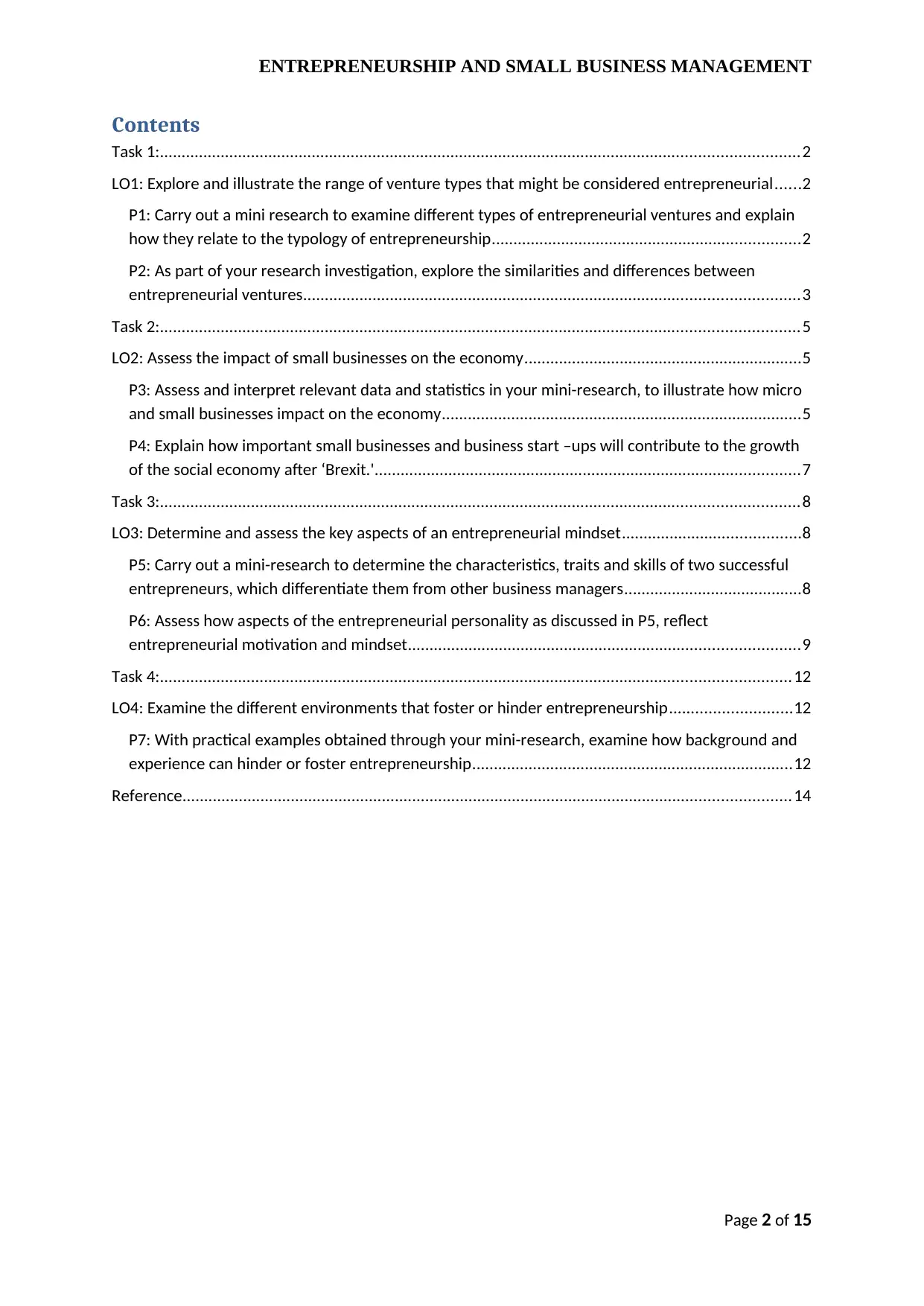
ENTREPRENEURSHIP AND SMALL BUSINESS MANAGEMENT
Contents
Task 1:...................................................................................................................................................2
LO1: Explore and illustrate the range of venture types that might be considered entrepreneurial......2
P1: Carry out a mini research to examine different types of entrepreneurial ventures and explain
how they relate to the typology of entrepreneurship.......................................................................2
P2: As part of your research investigation, explore the similarities and differences between
entrepreneurial ventures..................................................................................................................3
Task 2:...................................................................................................................................................5
LO2: Assess the impact of small businesses on the economy................................................................5
P3: Assess and interpret relevant data and statistics in your mini-research, to illustrate how micro
and small businesses impact on the economy...................................................................................5
P4: Explain how important small businesses and business start –ups will contribute to the growth
of the social economy after ‘Brexit.'..................................................................................................7
Task 3:...................................................................................................................................................8
LO3: Determine and assess the key aspects of an entrepreneurial mindset.........................................8
P5: Carry out a mini-research to determine the characteristics, traits and skills of two successful
entrepreneurs, which differentiate them from other business managers.........................................8
P6: Assess how aspects of the entrepreneurial personality as discussed in P5, reflect
entrepreneurial motivation and mindset..........................................................................................9
Task 4:.................................................................................................................................................12
LO4: Examine the different environments that foster or hinder entrepreneurship............................12
P7: With practical examples obtained through your mini-research, examine how background and
experience can hinder or foster entrepreneurship..........................................................................12
Reference............................................................................................................................................14
Page 2 of 15
Contents
Task 1:...................................................................................................................................................2
LO1: Explore and illustrate the range of venture types that might be considered entrepreneurial......2
P1: Carry out a mini research to examine different types of entrepreneurial ventures and explain
how they relate to the typology of entrepreneurship.......................................................................2
P2: As part of your research investigation, explore the similarities and differences between
entrepreneurial ventures..................................................................................................................3
Task 2:...................................................................................................................................................5
LO2: Assess the impact of small businesses on the economy................................................................5
P3: Assess and interpret relevant data and statistics in your mini-research, to illustrate how micro
and small businesses impact on the economy...................................................................................5
P4: Explain how important small businesses and business start –ups will contribute to the growth
of the social economy after ‘Brexit.'..................................................................................................7
Task 3:...................................................................................................................................................8
LO3: Determine and assess the key aspects of an entrepreneurial mindset.........................................8
P5: Carry out a mini-research to determine the characteristics, traits and skills of two successful
entrepreneurs, which differentiate them from other business managers.........................................8
P6: Assess how aspects of the entrepreneurial personality as discussed in P5, reflect
entrepreneurial motivation and mindset..........................................................................................9
Task 4:.................................................................................................................................................12
LO4: Examine the different environments that foster or hinder entrepreneurship............................12
P7: With practical examples obtained through your mini-research, examine how background and
experience can hinder or foster entrepreneurship..........................................................................12
Reference............................................................................................................................................14
Page 2 of 15
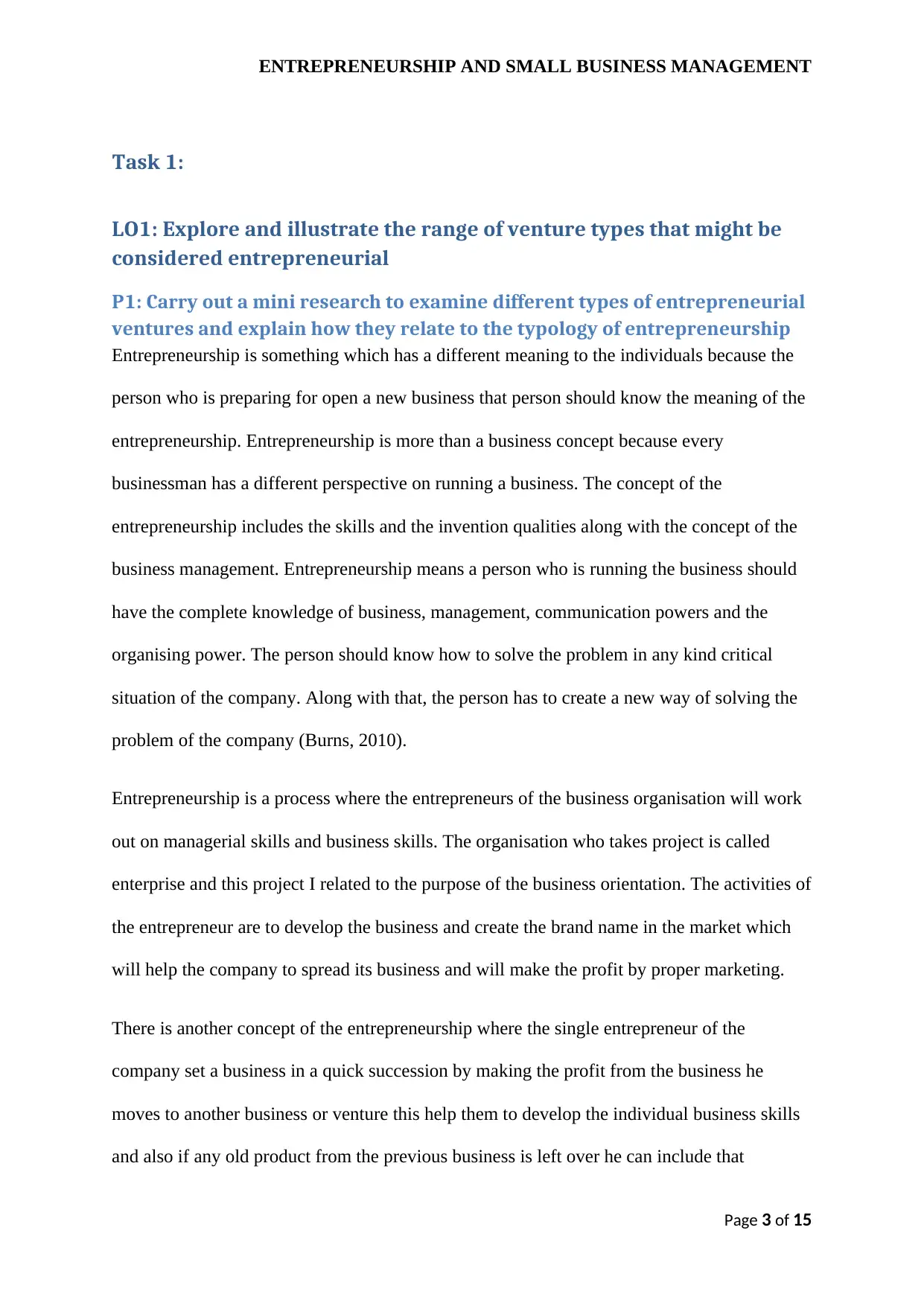
ENTREPRENEURSHIP AND SMALL BUSINESS MANAGEMENT
Task 1:
LO1: Explore and illustrate the range of venture types that might be
considered entrepreneurial
P1: Carry out a mini research to examine different types of entrepreneurial
ventures and explain how they relate to the typology of entrepreneurship
Entrepreneurship is something which has a different meaning to the individuals because the
person who is preparing for open a new business that person should know the meaning of the
entrepreneurship. Entrepreneurship is more than a business concept because every
businessman has a different perspective on running a business. The concept of the
entrepreneurship includes the skills and the invention qualities along with the concept of the
business management. Entrepreneurship means a person who is running the business should
have the complete knowledge of business, management, communication powers and the
organising power. The person should know how to solve the problem in any kind critical
situation of the company. Along with that, the person has to create a new way of solving the
problem of the company (Burns, 2010).
Entrepreneurship is a process where the entrepreneurs of the business organisation will work
out on managerial skills and business skills. The organisation who takes project is called
enterprise and this project I related to the purpose of the business orientation. The activities of
the entrepreneur are to develop the business and create the brand name in the market which
will help the company to spread its business and will make the profit by proper marketing.
There is another concept of the entrepreneurship where the single entrepreneur of the
company set a business in a quick succession by making the profit from the business he
moves to another business or venture this help them to develop the individual business skills
and also if any old product from the previous business is left over he can include that
Page 3 of 15
Task 1:
LO1: Explore and illustrate the range of venture types that might be
considered entrepreneurial
P1: Carry out a mini research to examine different types of entrepreneurial
ventures and explain how they relate to the typology of entrepreneurship
Entrepreneurship is something which has a different meaning to the individuals because the
person who is preparing for open a new business that person should know the meaning of the
entrepreneurship. Entrepreneurship is more than a business concept because every
businessman has a different perspective on running a business. The concept of the
entrepreneurship includes the skills and the invention qualities along with the concept of the
business management. Entrepreneurship means a person who is running the business should
have the complete knowledge of business, management, communication powers and the
organising power. The person should know how to solve the problem in any kind critical
situation of the company. Along with that, the person has to create a new way of solving the
problem of the company (Burns, 2010).
Entrepreneurship is a process where the entrepreneurs of the business organisation will work
out on managerial skills and business skills. The organisation who takes project is called
enterprise and this project I related to the purpose of the business orientation. The activities of
the entrepreneur are to develop the business and create the brand name in the market which
will help the company to spread its business and will make the profit by proper marketing.
There is another concept of the entrepreneurship where the single entrepreneur of the
company set a business in a quick succession by making the profit from the business he
moves to another business or venture this help them to develop the individual business skills
and also if any old product from the previous business is left over he can include that
Page 3 of 15
⊘ This is a preview!⊘
Do you want full access?
Subscribe today to unlock all pages.

Trusted by 1+ million students worldwide
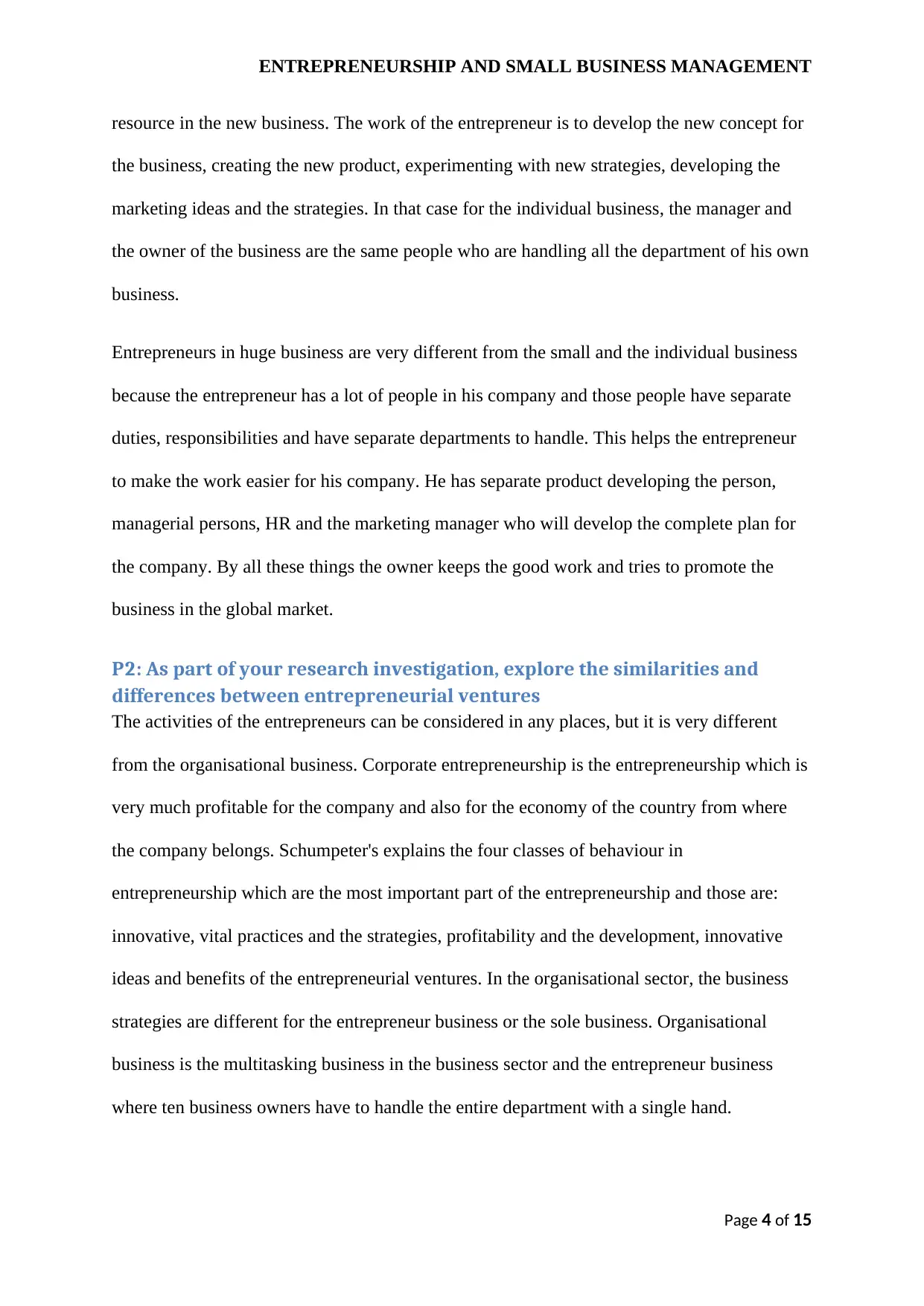
ENTREPRENEURSHIP AND SMALL BUSINESS MANAGEMENT
resource in the new business. The work of the entrepreneur is to develop the new concept for
the business, creating the new product, experimenting with new strategies, developing the
marketing ideas and the strategies. In that case for the individual business, the manager and
the owner of the business are the same people who are handling all the department of his own
business.
Entrepreneurs in huge business are very different from the small and the individual business
because the entrepreneur has a lot of people in his company and those people have separate
duties, responsibilities and have separate departments to handle. This helps the entrepreneur
to make the work easier for his company. He has separate product developing the person,
managerial persons, HR and the marketing manager who will develop the complete plan for
the company. By all these things the owner keeps the good work and tries to promote the
business in the global market.
P2: As part of your research investigation, explore the similarities and
differences between entrepreneurial ventures
The activities of the entrepreneurs can be considered in any places, but it is very different
from the organisational business. Corporate entrepreneurship is the entrepreneurship which is
very much profitable for the company and also for the economy of the country from where
the company belongs. Schumpeter's explains the four classes of behaviour in
entrepreneurship which are the most important part of the entrepreneurship and those are:
innovative, vital practices and the strategies, profitability and the development, innovative
ideas and benefits of the entrepreneurial ventures. In the organisational sector, the business
strategies are different for the entrepreneur business or the sole business. Organisational
business is the multitasking business in the business sector and the entrepreneur business
where ten business owners have to handle the entire department with a single hand.
Page 4 of 15
resource in the new business. The work of the entrepreneur is to develop the new concept for
the business, creating the new product, experimenting with new strategies, developing the
marketing ideas and the strategies. In that case for the individual business, the manager and
the owner of the business are the same people who are handling all the department of his own
business.
Entrepreneurs in huge business are very different from the small and the individual business
because the entrepreneur has a lot of people in his company and those people have separate
duties, responsibilities and have separate departments to handle. This helps the entrepreneur
to make the work easier for his company. He has separate product developing the person,
managerial persons, HR and the marketing manager who will develop the complete plan for
the company. By all these things the owner keeps the good work and tries to promote the
business in the global market.
P2: As part of your research investigation, explore the similarities and
differences between entrepreneurial ventures
The activities of the entrepreneurs can be considered in any places, but it is very different
from the organisational business. Corporate entrepreneurship is the entrepreneurship which is
very much profitable for the company and also for the economy of the country from where
the company belongs. Schumpeter's explains the four classes of behaviour in
entrepreneurship which are the most important part of the entrepreneurship and those are:
innovative, vital practices and the strategies, profitability and the development, innovative
ideas and benefits of the entrepreneurial ventures. In the organisational sector, the business
strategies are different for the entrepreneur business or the sole business. Organisational
business is the multitasking business in the business sector and the entrepreneur business
where ten business owners have to handle the entire department with a single hand.
Page 4 of 15
Paraphrase This Document
Need a fresh take? Get an instant paraphrase of this document with our AI Paraphraser
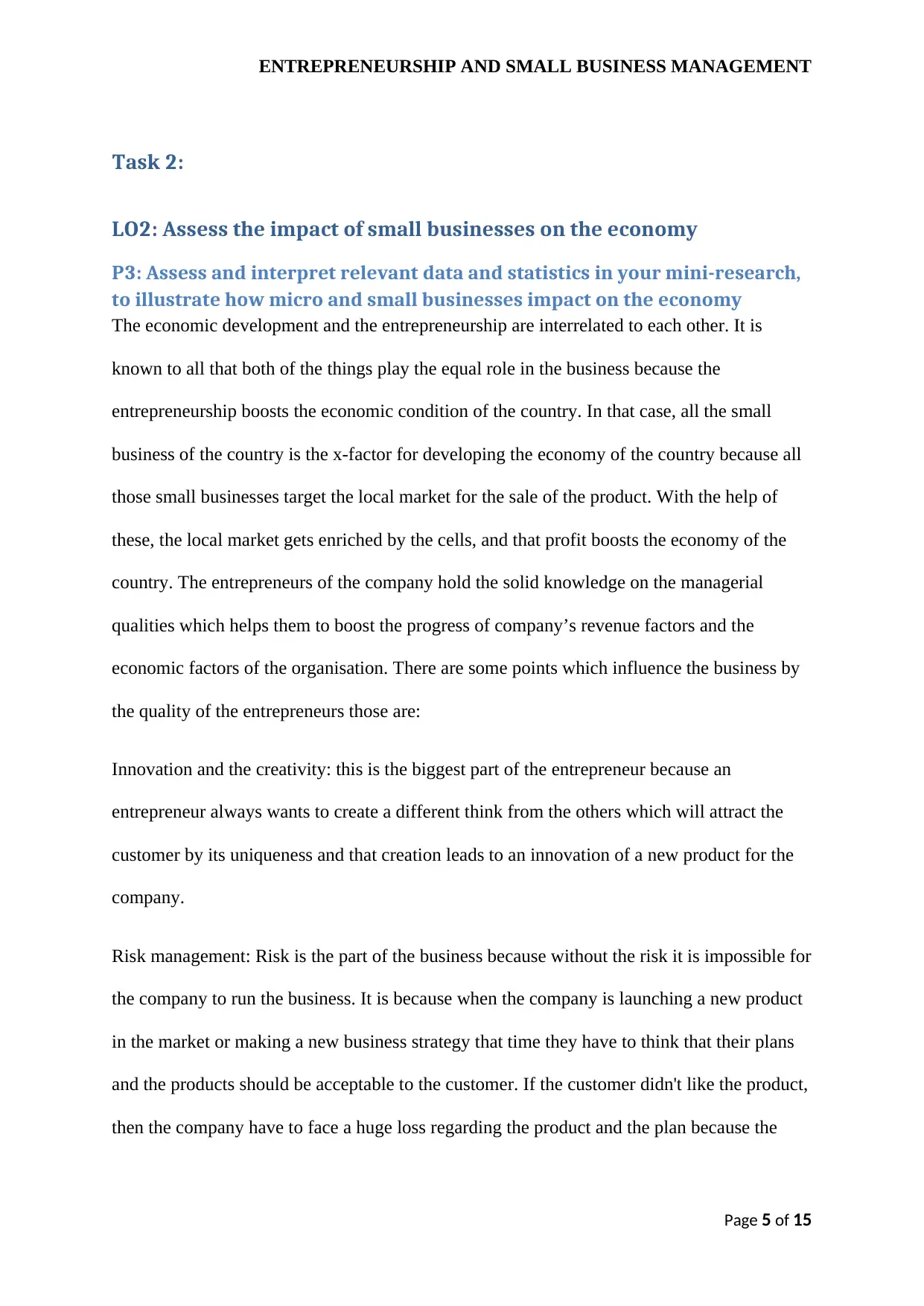
ENTREPRENEURSHIP AND SMALL BUSINESS MANAGEMENT
Task 2:
LO2: Assess the impact of small businesses on the economy
P3: Assess and interpret relevant data and statistics in your mini-research,
to illustrate how micro and small businesses impact on the economy
The economic development and the entrepreneurship are interrelated to each other. It is
known to all that both of the things play the equal role in the business because the
entrepreneurship boosts the economic condition of the country. In that case, all the small
business of the country is the x-factor for developing the economy of the country because all
those small businesses target the local market for the sale of the product. With the help of
these, the local market gets enriched by the cells, and that profit boosts the economy of the
country. The entrepreneurs of the company hold the solid knowledge on the managerial
qualities which helps them to boost the progress of company’s revenue factors and the
economic factors of the organisation. There are some points which influence the business by
the quality of the entrepreneurs those are:
Innovation and the creativity: this is the biggest part of the entrepreneur because an
entrepreneur always wants to create a different think from the others which will attract the
customer by its uniqueness and that creation leads to an innovation of a new product for the
company.
Risk management: Risk is the part of the business because without the risk it is impossible for
the company to run the business. It is because when the company is launching a new product
in the market or making a new business strategy that time they have to think that their plans
and the products should be acceptable to the customer. If the customer didn't like the product,
then the company have to face a huge loss regarding the product and the plan because the
Page 5 of 15
Task 2:
LO2: Assess the impact of small businesses on the economy
P3: Assess and interpret relevant data and statistics in your mini-research,
to illustrate how micro and small businesses impact on the economy
The economic development and the entrepreneurship are interrelated to each other. It is
known to all that both of the things play the equal role in the business because the
entrepreneurship boosts the economic condition of the country. In that case, all the small
business of the country is the x-factor for developing the economy of the country because all
those small businesses target the local market for the sale of the product. With the help of
these, the local market gets enriched by the cells, and that profit boosts the economy of the
country. The entrepreneurs of the company hold the solid knowledge on the managerial
qualities which helps them to boost the progress of company’s revenue factors and the
economic factors of the organisation. There are some points which influence the business by
the quality of the entrepreneurs those are:
Innovation and the creativity: this is the biggest part of the entrepreneur because an
entrepreneur always wants to create a different think from the others which will attract the
customer by its uniqueness and that creation leads to an innovation of a new product for the
company.
Risk management: Risk is the part of the business because without the risk it is impossible for
the company to run the business. It is because when the company is launching a new product
in the market or making a new business strategy that time they have to think that their plans
and the products should be acceptable to the customer. If the customer didn't like the product,
then the company have to face a huge loss regarding the product and the plan because the
Page 5 of 15
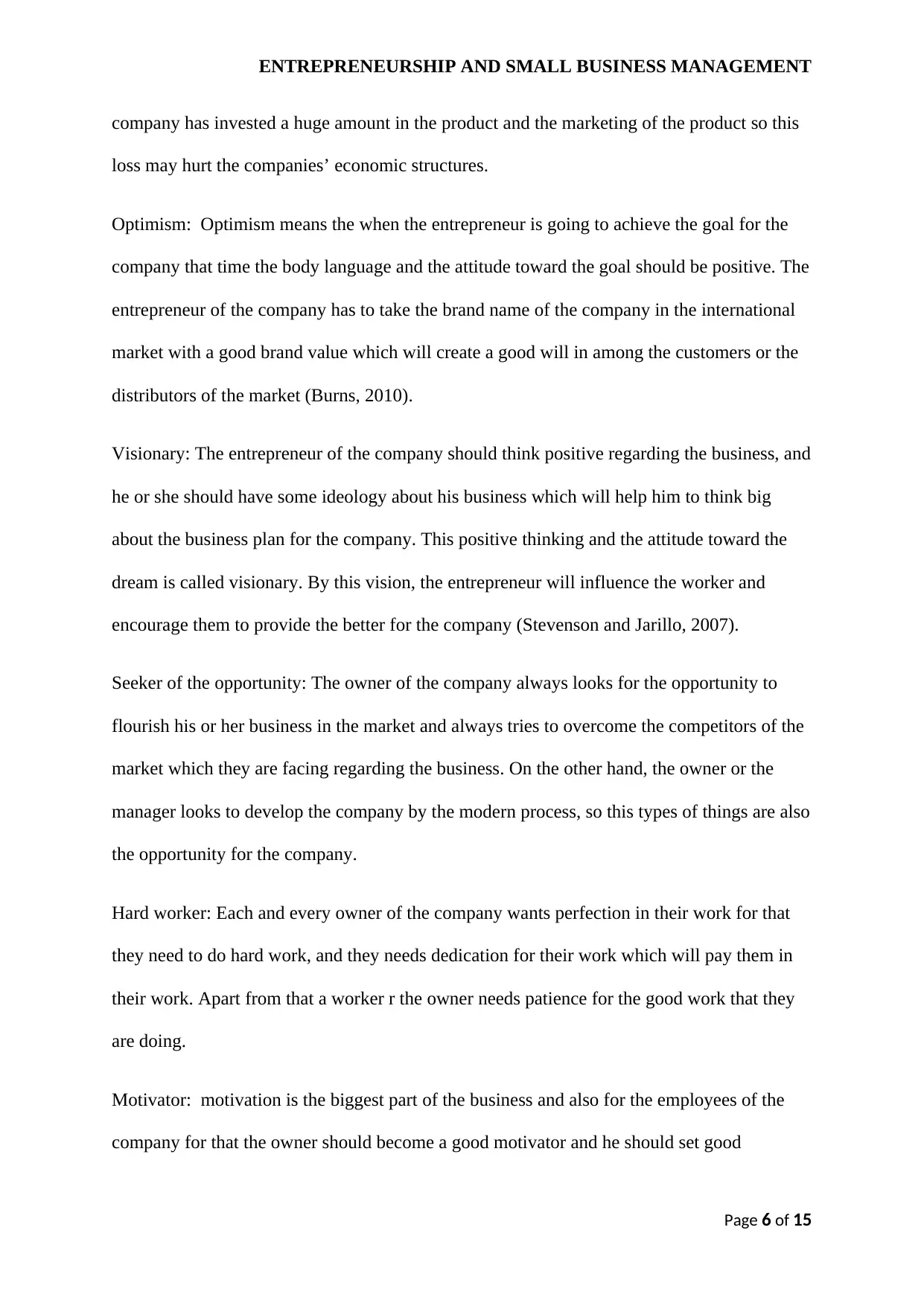
ENTREPRENEURSHIP AND SMALL BUSINESS MANAGEMENT
company has invested a huge amount in the product and the marketing of the product so this
loss may hurt the companies’ economic structures.
Optimism: Optimism means the when the entrepreneur is going to achieve the goal for the
company that time the body language and the attitude toward the goal should be positive. The
entrepreneur of the company has to take the brand name of the company in the international
market with a good brand value which will create a good will in among the customers or the
distributors of the market (Burns, 2010).
Visionary: The entrepreneur of the company should think positive regarding the business, and
he or she should have some ideology about his business which will help him to think big
about the business plan for the company. This positive thinking and the attitude toward the
dream is called visionary. By this vision, the entrepreneur will influence the worker and
encourage them to provide the better for the company (Stevenson and Jarillo, 2007).
Seeker of the opportunity: The owner of the company always looks for the opportunity to
flourish his or her business in the market and always tries to overcome the competitors of the
market which they are facing regarding the business. On the other hand, the owner or the
manager looks to develop the company by the modern process, so this types of things are also
the opportunity for the company.
Hard worker: Each and every owner of the company wants perfection in their work for that
they need to do hard work, and they needs dedication for their work which will pay them in
their work. Apart from that a worker r the owner needs patience for the good work that they
are doing.
Motivator: motivation is the biggest part of the business and also for the employees of the
company for that the owner should become a good motivator and he should set good
Page 6 of 15
company has invested a huge amount in the product and the marketing of the product so this
loss may hurt the companies’ economic structures.
Optimism: Optimism means the when the entrepreneur is going to achieve the goal for the
company that time the body language and the attitude toward the goal should be positive. The
entrepreneur of the company has to take the brand name of the company in the international
market with a good brand value which will create a good will in among the customers or the
distributors of the market (Burns, 2010).
Visionary: The entrepreneur of the company should think positive regarding the business, and
he or she should have some ideology about his business which will help him to think big
about the business plan for the company. This positive thinking and the attitude toward the
dream is called visionary. By this vision, the entrepreneur will influence the worker and
encourage them to provide the better for the company (Stevenson and Jarillo, 2007).
Seeker of the opportunity: The owner of the company always looks for the opportunity to
flourish his or her business in the market and always tries to overcome the competitors of the
market which they are facing regarding the business. On the other hand, the owner or the
manager looks to develop the company by the modern process, so this types of things are also
the opportunity for the company.
Hard worker: Each and every owner of the company wants perfection in their work for that
they need to do hard work, and they needs dedication for their work which will pay them in
their work. Apart from that a worker r the owner needs patience for the good work that they
are doing.
Motivator: motivation is the biggest part of the business and also for the employees of the
company for that the owner should become a good motivator and he should set good
Page 6 of 15
⊘ This is a preview!⊘
Do you want full access?
Subscribe today to unlock all pages.

Trusted by 1+ million students worldwide
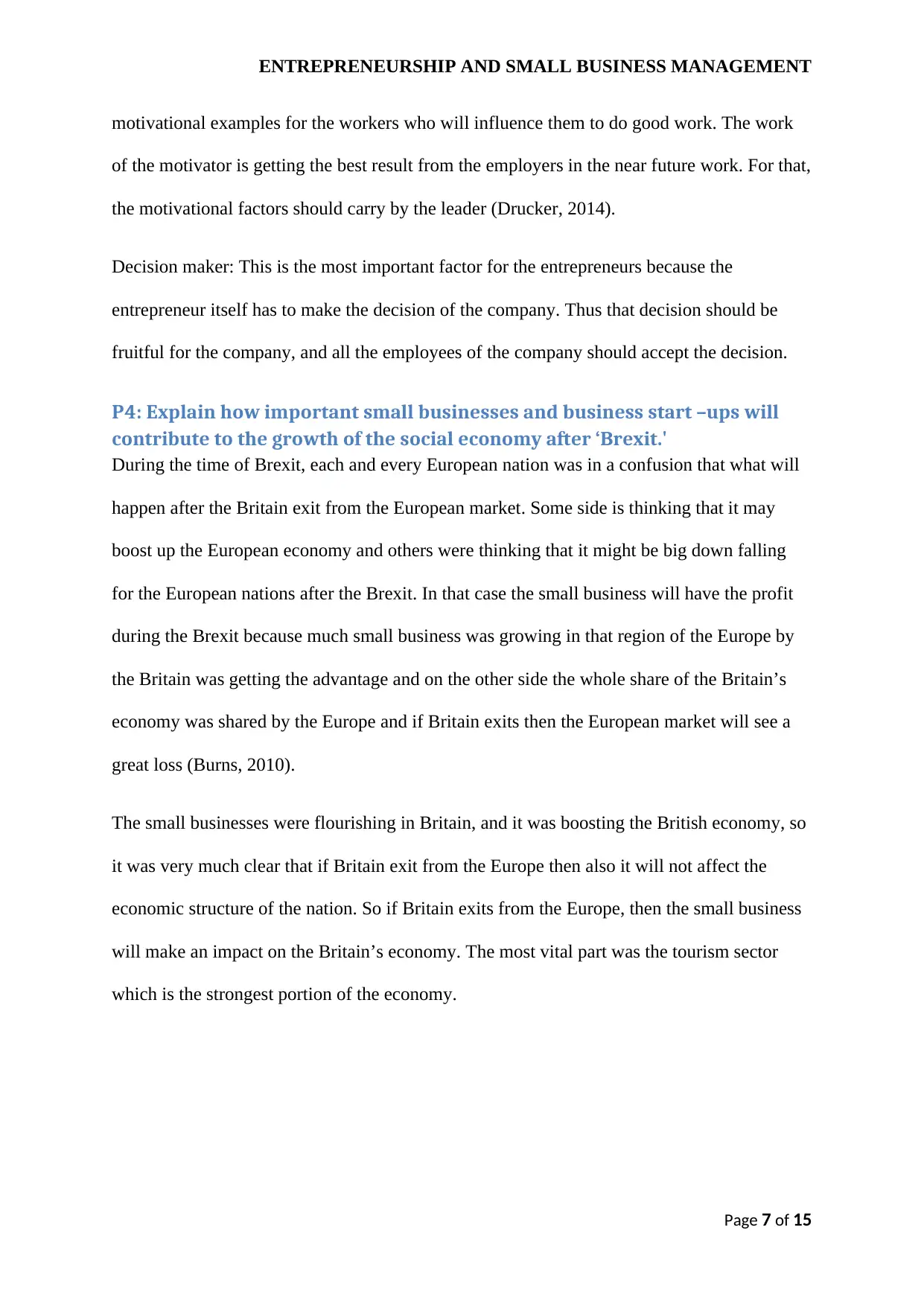
ENTREPRENEURSHIP AND SMALL BUSINESS MANAGEMENT
motivational examples for the workers who will influence them to do good work. The work
of the motivator is getting the best result from the employers in the near future work. For that,
the motivational factors should carry by the leader (Drucker, 2014).
Decision maker: This is the most important factor for the entrepreneurs because the
entrepreneur itself has to make the decision of the company. Thus that decision should be
fruitful for the company, and all the employees of the company should accept the decision.
P4: Explain how important small businesses and business start –ups will
contribute to the growth of the social economy after ‘Brexit.'
During the time of Brexit, each and every European nation was in a confusion that what will
happen after the Britain exit from the European market. Some side is thinking that it may
boost up the European economy and others were thinking that it might be big down falling
for the European nations after the Brexit. In that case the small business will have the profit
during the Brexit because much small business was growing in that region of the Europe by
the Britain was getting the advantage and on the other side the whole share of the Britain’s
economy was shared by the Europe and if Britain exits then the European market will see a
great loss (Burns, 2010).
The small businesses were flourishing in Britain, and it was boosting the British economy, so
it was very much clear that if Britain exit from the Europe then also it will not affect the
economic structure of the nation. So if Britain exits from the Europe, then the small business
will make an impact on the Britain’s economy. The most vital part was the tourism sector
which is the strongest portion of the economy.
Page 7 of 15
motivational examples for the workers who will influence them to do good work. The work
of the motivator is getting the best result from the employers in the near future work. For that,
the motivational factors should carry by the leader (Drucker, 2014).
Decision maker: This is the most important factor for the entrepreneurs because the
entrepreneur itself has to make the decision of the company. Thus that decision should be
fruitful for the company, and all the employees of the company should accept the decision.
P4: Explain how important small businesses and business start –ups will
contribute to the growth of the social economy after ‘Brexit.'
During the time of Brexit, each and every European nation was in a confusion that what will
happen after the Britain exit from the European market. Some side is thinking that it may
boost up the European economy and others were thinking that it might be big down falling
for the European nations after the Brexit. In that case the small business will have the profit
during the Brexit because much small business was growing in that region of the Europe by
the Britain was getting the advantage and on the other side the whole share of the Britain’s
economy was shared by the Europe and if Britain exits then the European market will see a
great loss (Burns, 2010).
The small businesses were flourishing in Britain, and it was boosting the British economy, so
it was very much clear that if Britain exit from the Europe then also it will not affect the
economic structure of the nation. So if Britain exits from the Europe, then the small business
will make an impact on the Britain’s economy. The most vital part was the tourism sector
which is the strongest portion of the economy.
Page 7 of 15
Paraphrase This Document
Need a fresh take? Get an instant paraphrase of this document with our AI Paraphraser
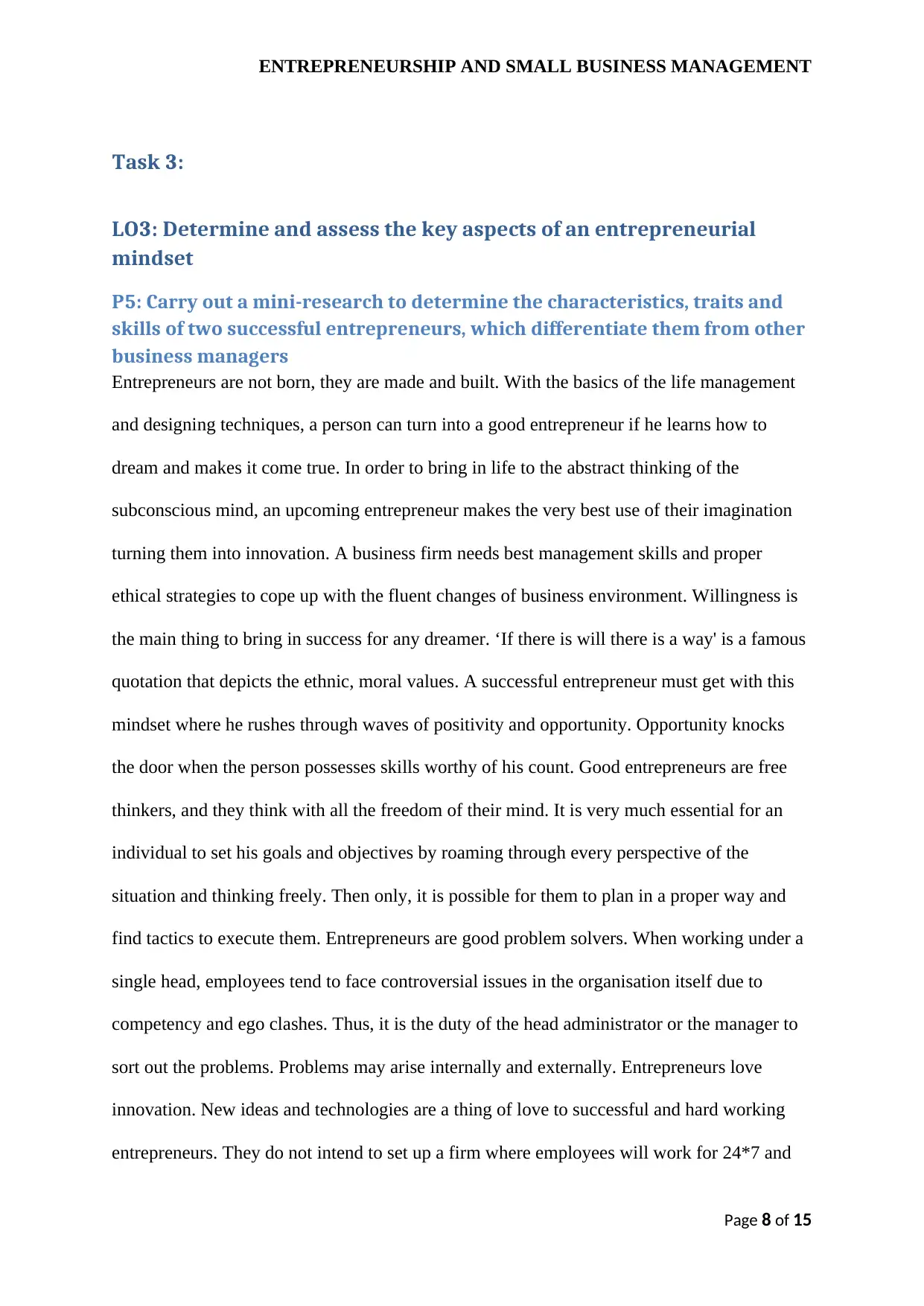
ENTREPRENEURSHIP AND SMALL BUSINESS MANAGEMENT
Task 3:
LO3: Determine and assess the key aspects of an entrepreneurial
mindset
P5: Carry out a mini-research to determine the characteristics, traits and
skills of two successful entrepreneurs, which differentiate them from other
business managers
Entrepreneurs are not born, they are made and built. With the basics of the life management
and designing techniques, a person can turn into a good entrepreneur if he learns how to
dream and makes it come true. In order to bring in life to the abstract thinking of the
subconscious mind, an upcoming entrepreneur makes the very best use of their imagination
turning them into innovation. A business firm needs best management skills and proper
ethical strategies to cope up with the fluent changes of business environment. Willingness is
the main thing to bring in success for any dreamer. ‘If there is will there is a way' is a famous
quotation that depicts the ethnic, moral values. A successful entrepreneur must get with this
mindset where he rushes through waves of positivity and opportunity. Opportunity knocks
the door when the person possesses skills worthy of his count. Good entrepreneurs are free
thinkers, and they think with all the freedom of their mind. It is very much essential for an
individual to set his goals and objectives by roaming through every perspective of the
situation and thinking freely. Then only, it is possible for them to plan in a proper way and
find tactics to execute them. Entrepreneurs are good problem solvers. When working under a
single head, employees tend to face controversial issues in the organisation itself due to
competency and ego clashes. Thus, it is the duty of the head administrator or the manager to
sort out the problems. Problems may arise internally and externally. Entrepreneurs love
innovation. New ideas and technologies are a thing of love to successful and hard working
entrepreneurs. They do not intend to set up a firm where employees will work for 24*7 and
Page 8 of 15
Task 3:
LO3: Determine and assess the key aspects of an entrepreneurial
mindset
P5: Carry out a mini-research to determine the characteristics, traits and
skills of two successful entrepreneurs, which differentiate them from other
business managers
Entrepreneurs are not born, they are made and built. With the basics of the life management
and designing techniques, a person can turn into a good entrepreneur if he learns how to
dream and makes it come true. In order to bring in life to the abstract thinking of the
subconscious mind, an upcoming entrepreneur makes the very best use of their imagination
turning them into innovation. A business firm needs best management skills and proper
ethical strategies to cope up with the fluent changes of business environment. Willingness is
the main thing to bring in success for any dreamer. ‘If there is will there is a way' is a famous
quotation that depicts the ethnic, moral values. A successful entrepreneur must get with this
mindset where he rushes through waves of positivity and opportunity. Opportunity knocks
the door when the person possesses skills worthy of his count. Good entrepreneurs are free
thinkers, and they think with all the freedom of their mind. It is very much essential for an
individual to set his goals and objectives by roaming through every perspective of the
situation and thinking freely. Then only, it is possible for them to plan in a proper way and
find tactics to execute them. Entrepreneurs are good problem solvers. When working under a
single head, employees tend to face controversial issues in the organisation itself due to
competency and ego clashes. Thus, it is the duty of the head administrator or the manager to
sort out the problems. Problems may arise internally and externally. Entrepreneurs love
innovation. New ideas and technologies are a thing of love to successful and hard working
entrepreneurs. They do not intend to set up a firm where employees will work for 24*7 and
Page 8 of 15
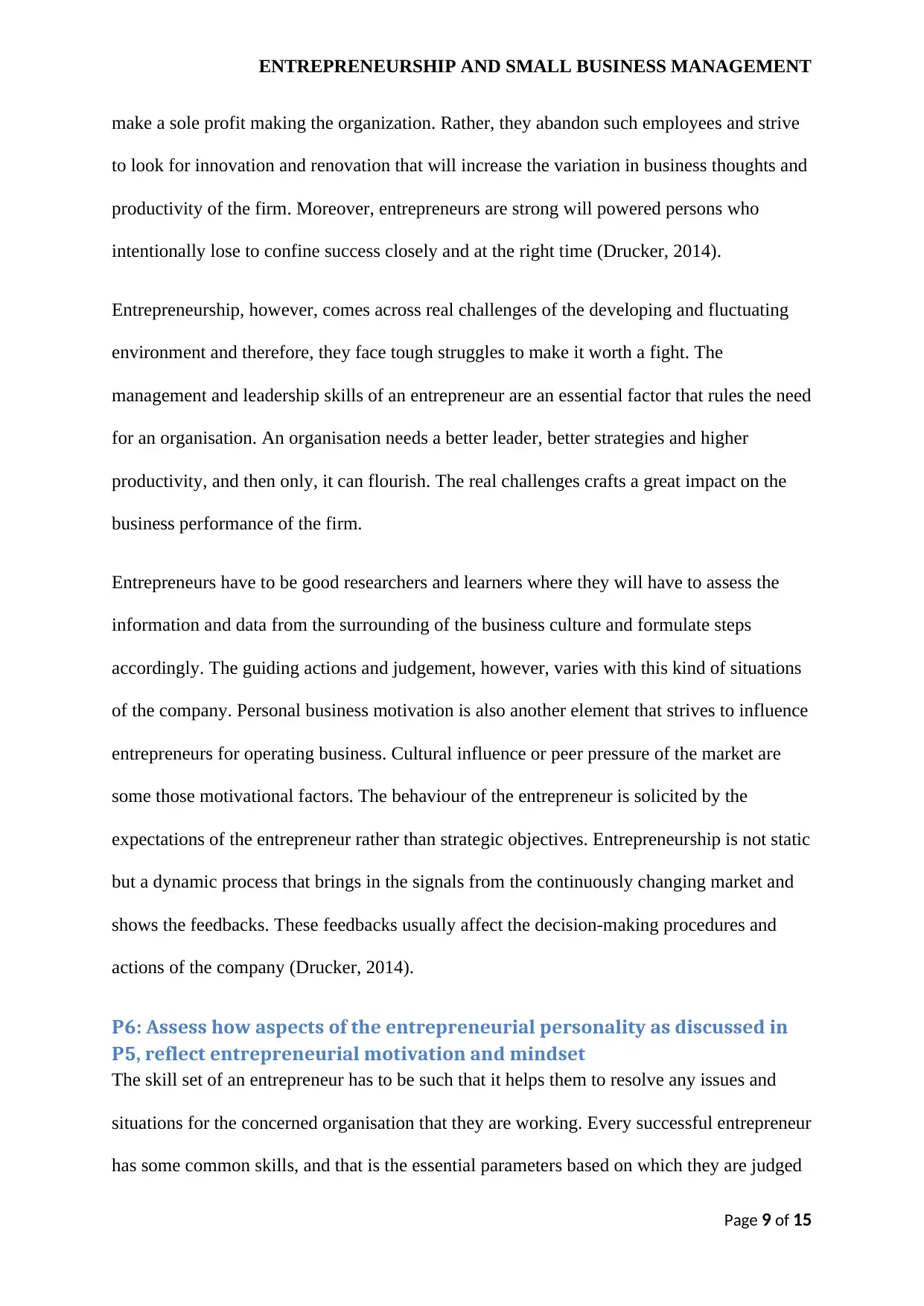
ENTREPRENEURSHIP AND SMALL BUSINESS MANAGEMENT
make a sole profit making the organization. Rather, they abandon such employees and strive
to look for innovation and renovation that will increase the variation in business thoughts and
productivity of the firm. Moreover, entrepreneurs are strong will powered persons who
intentionally lose to confine success closely and at the right time (Drucker, 2014).
Entrepreneurship, however, comes across real challenges of the developing and fluctuating
environment and therefore, they face tough struggles to make it worth a fight. The
management and leadership skills of an entrepreneur are an essential factor that rules the need
for an organisation. An organisation needs a better leader, better strategies and higher
productivity, and then only, it can flourish. The real challenges crafts a great impact on the
business performance of the firm.
Entrepreneurs have to be good researchers and learners where they will have to assess the
information and data from the surrounding of the business culture and formulate steps
accordingly. The guiding actions and judgement, however, varies with this kind of situations
of the company. Personal business motivation is also another element that strives to influence
entrepreneurs for operating business. Cultural influence or peer pressure of the market are
some those motivational factors. The behaviour of the entrepreneur is solicited by the
expectations of the entrepreneur rather than strategic objectives. Entrepreneurship is not static
but a dynamic process that brings in the signals from the continuously changing market and
shows the feedbacks. These feedbacks usually affect the decision-making procedures and
actions of the company (Drucker, 2014).
P6: Assess how aspects of the entrepreneurial personality as discussed in
P5, reflect entrepreneurial motivation and mindset
The skill set of an entrepreneur has to be such that it helps them to resolve any issues and
situations for the concerned organisation that they are working. Every successful entrepreneur
has some common skills, and that is the essential parameters based on which they are judged
Page 9 of 15
make a sole profit making the organization. Rather, they abandon such employees and strive
to look for innovation and renovation that will increase the variation in business thoughts and
productivity of the firm. Moreover, entrepreneurs are strong will powered persons who
intentionally lose to confine success closely and at the right time (Drucker, 2014).
Entrepreneurship, however, comes across real challenges of the developing and fluctuating
environment and therefore, they face tough struggles to make it worth a fight. The
management and leadership skills of an entrepreneur are an essential factor that rules the need
for an organisation. An organisation needs a better leader, better strategies and higher
productivity, and then only, it can flourish. The real challenges crafts a great impact on the
business performance of the firm.
Entrepreneurs have to be good researchers and learners where they will have to assess the
information and data from the surrounding of the business culture and formulate steps
accordingly. The guiding actions and judgement, however, varies with this kind of situations
of the company. Personal business motivation is also another element that strives to influence
entrepreneurs for operating business. Cultural influence or peer pressure of the market are
some those motivational factors. The behaviour of the entrepreneur is solicited by the
expectations of the entrepreneur rather than strategic objectives. Entrepreneurship is not static
but a dynamic process that brings in the signals from the continuously changing market and
shows the feedbacks. These feedbacks usually affect the decision-making procedures and
actions of the company (Drucker, 2014).
P6: Assess how aspects of the entrepreneurial personality as discussed in
P5, reflect entrepreneurial motivation and mindset
The skill set of an entrepreneur has to be such that it helps them to resolve any issues and
situations for the concerned organisation that they are working. Every successful entrepreneur
has some common skills, and that is the essential parameters based on which they are judged
Page 9 of 15
⊘ This is a preview!⊘
Do you want full access?
Subscribe today to unlock all pages.

Trusted by 1+ million students worldwide
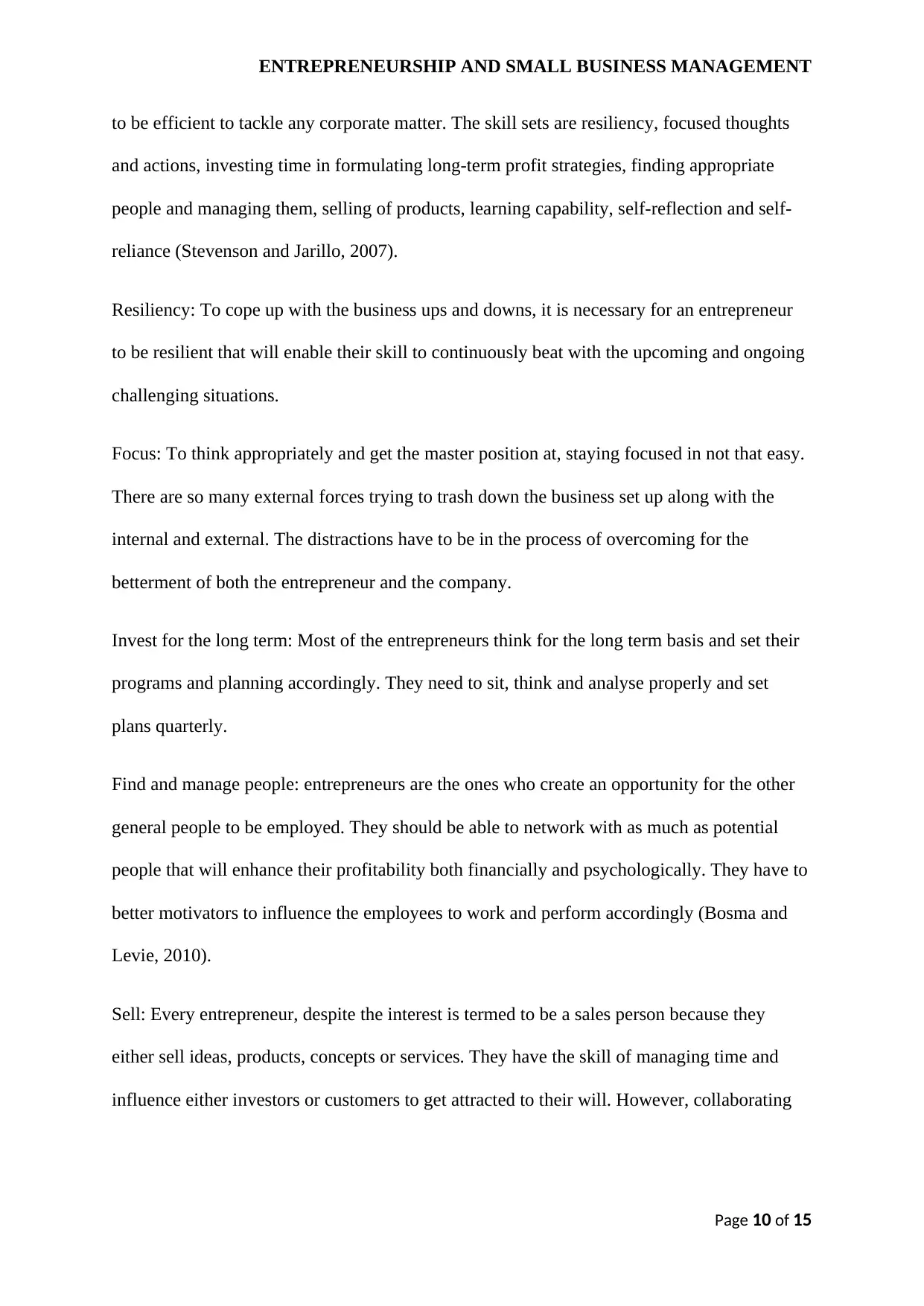
ENTREPRENEURSHIP AND SMALL BUSINESS MANAGEMENT
to be efficient to tackle any corporate matter. The skill sets are resiliency, focused thoughts
and actions, investing time in formulating long-term profit strategies, finding appropriate
people and managing them, selling of products, learning capability, self-reflection and self-
reliance (Stevenson and Jarillo, 2007).
Resiliency: To cope up with the business ups and downs, it is necessary for an entrepreneur
to be resilient that will enable their skill to continuously beat with the upcoming and ongoing
challenging situations.
Focus: To think appropriately and get the master position at, staying focused in not that easy.
There are so many external forces trying to trash down the business set up along with the
internal and external. The distractions have to be in the process of overcoming for the
betterment of both the entrepreneur and the company.
Invest for the long term: Most of the entrepreneurs think for the long term basis and set their
programs and planning accordingly. They need to sit, think and analyse properly and set
plans quarterly.
Find and manage people: entrepreneurs are the ones who create an opportunity for the other
general people to be employed. They should be able to network with as much as potential
people that will enhance their profitability both financially and psychologically. They have to
better motivators to influence the employees to work and perform accordingly (Bosma and
Levie, 2010).
Sell: Every entrepreneur, despite the interest is termed to be a sales person because they
either sell ideas, products, concepts or services. They have the skill of managing time and
influence either investors or customers to get attracted to their will. However, collaborating
Page 10 of 15
to be efficient to tackle any corporate matter. The skill sets are resiliency, focused thoughts
and actions, investing time in formulating long-term profit strategies, finding appropriate
people and managing them, selling of products, learning capability, self-reflection and self-
reliance (Stevenson and Jarillo, 2007).
Resiliency: To cope up with the business ups and downs, it is necessary for an entrepreneur
to be resilient that will enable their skill to continuously beat with the upcoming and ongoing
challenging situations.
Focus: To think appropriately and get the master position at, staying focused in not that easy.
There are so many external forces trying to trash down the business set up along with the
internal and external. The distractions have to be in the process of overcoming for the
betterment of both the entrepreneur and the company.
Invest for the long term: Most of the entrepreneurs think for the long term basis and set their
programs and planning accordingly. They need to sit, think and analyse properly and set
plans quarterly.
Find and manage people: entrepreneurs are the ones who create an opportunity for the other
general people to be employed. They should be able to network with as much as potential
people that will enhance their profitability both financially and psychologically. They have to
better motivators to influence the employees to work and perform accordingly (Bosma and
Levie, 2010).
Sell: Every entrepreneur, despite the interest is termed to be a sales person because they
either sell ideas, products, concepts or services. They have the skill of managing time and
influence either investors or customers to get attracted to their will. However, collaborating
Page 10 of 15
Paraphrase This Document
Need a fresh take? Get an instant paraphrase of this document with our AI Paraphraser
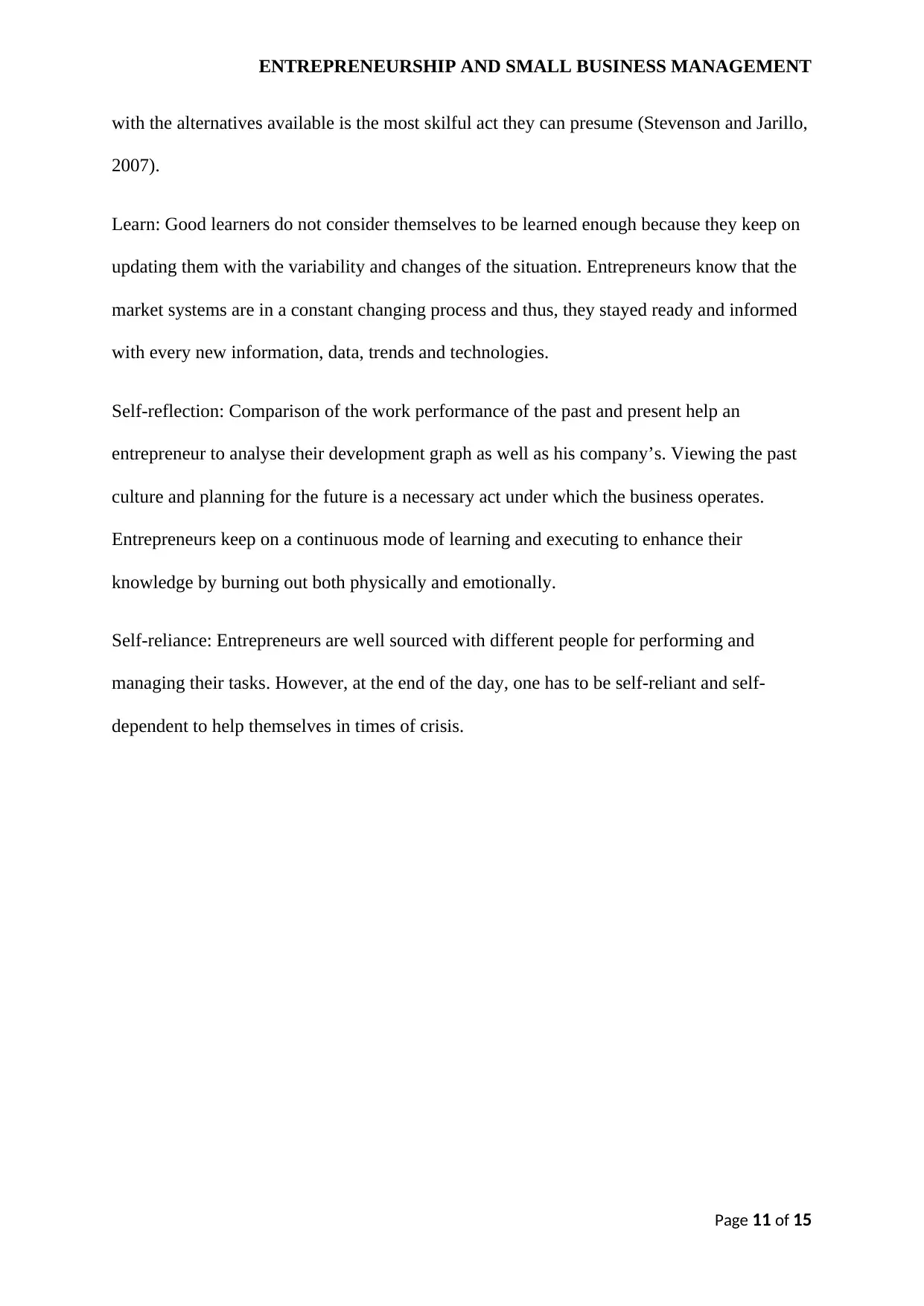
ENTREPRENEURSHIP AND SMALL BUSINESS MANAGEMENT
with the alternatives available is the most skilful act they can presume (Stevenson and Jarillo,
2007).
Learn: Good learners do not consider themselves to be learned enough because they keep on
updating them with the variability and changes of the situation. Entrepreneurs know that the
market systems are in a constant changing process and thus, they stayed ready and informed
with every new information, data, trends and technologies.
Self-reflection: Comparison of the work performance of the past and present help an
entrepreneur to analyse their development graph as well as his company’s. Viewing the past
culture and planning for the future is a necessary act under which the business operates.
Entrepreneurs keep on a continuous mode of learning and executing to enhance their
knowledge by burning out both physically and emotionally.
Self-reliance: Entrepreneurs are well sourced with different people for performing and
managing their tasks. However, at the end of the day, one has to be self-reliant and self-
dependent to help themselves in times of crisis.
Page 11 of 15
with the alternatives available is the most skilful act they can presume (Stevenson and Jarillo,
2007).
Learn: Good learners do not consider themselves to be learned enough because they keep on
updating them with the variability and changes of the situation. Entrepreneurs know that the
market systems are in a constant changing process and thus, they stayed ready and informed
with every new information, data, trends and technologies.
Self-reflection: Comparison of the work performance of the past and present help an
entrepreneur to analyse their development graph as well as his company’s. Viewing the past
culture and planning for the future is a necessary act under which the business operates.
Entrepreneurs keep on a continuous mode of learning and executing to enhance their
knowledge by burning out both physically and emotionally.
Self-reliance: Entrepreneurs are well sourced with different people for performing and
managing their tasks. However, at the end of the day, one has to be self-reliant and self-
dependent to help themselves in times of crisis.
Page 11 of 15
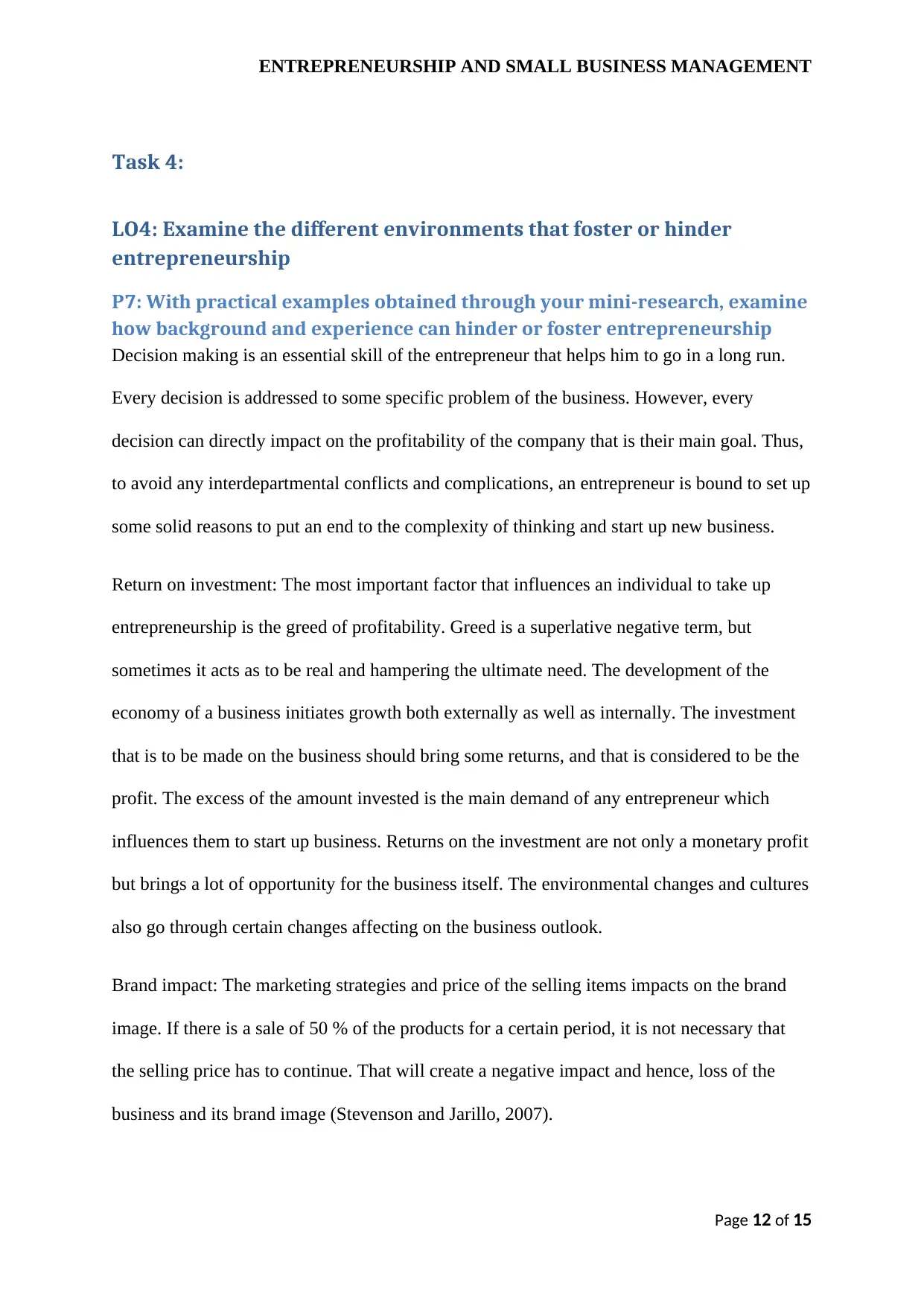
ENTREPRENEURSHIP AND SMALL BUSINESS MANAGEMENT
Task 4:
LO4: Examine the different environments that foster or hinder
entrepreneurship
P7: With practical examples obtained through your mini-research, examine
how background and experience can hinder or foster entrepreneurship
Decision making is an essential skill of the entrepreneur that helps him to go in a long run.
Every decision is addressed to some specific problem of the business. However, every
decision can directly impact on the profitability of the company that is their main goal. Thus,
to avoid any interdepartmental conflicts and complications, an entrepreneur is bound to set up
some solid reasons to put an end to the complexity of thinking and start up new business.
Return on investment: The most important factor that influences an individual to take up
entrepreneurship is the greed of profitability. Greed is a superlative negative term, but
sometimes it acts as to be real and hampering the ultimate need. The development of the
economy of a business initiates growth both externally as well as internally. The investment
that is to be made on the business should bring some returns, and that is considered to be the
profit. The excess of the amount invested is the main demand of any entrepreneur which
influences them to start up business. Returns on the investment are not only a monetary profit
but brings a lot of opportunity for the business itself. The environmental changes and cultures
also go through certain changes affecting on the business outlook.
Brand impact: The marketing strategies and price of the selling items impacts on the brand
image. If there is a sale of 50 % of the products for a certain period, it is not necessary that
the selling price has to continue. That will create a negative impact and hence, loss of the
business and its brand image (Stevenson and Jarillo, 2007).
Page 12 of 15
Task 4:
LO4: Examine the different environments that foster or hinder
entrepreneurship
P7: With practical examples obtained through your mini-research, examine
how background and experience can hinder or foster entrepreneurship
Decision making is an essential skill of the entrepreneur that helps him to go in a long run.
Every decision is addressed to some specific problem of the business. However, every
decision can directly impact on the profitability of the company that is their main goal. Thus,
to avoid any interdepartmental conflicts and complications, an entrepreneur is bound to set up
some solid reasons to put an end to the complexity of thinking and start up new business.
Return on investment: The most important factor that influences an individual to take up
entrepreneurship is the greed of profitability. Greed is a superlative negative term, but
sometimes it acts as to be real and hampering the ultimate need. The development of the
economy of a business initiates growth both externally as well as internally. The investment
that is to be made on the business should bring some returns, and that is considered to be the
profit. The excess of the amount invested is the main demand of any entrepreneur which
influences them to start up business. Returns on the investment are not only a monetary profit
but brings a lot of opportunity for the business itself. The environmental changes and cultures
also go through certain changes affecting on the business outlook.
Brand impact: The marketing strategies and price of the selling items impacts on the brand
image. If there is a sale of 50 % of the products for a certain period, it is not necessary that
the selling price has to continue. That will create a negative impact and hence, loss of the
business and its brand image (Stevenson and Jarillo, 2007).
Page 12 of 15
⊘ This is a preview!⊘
Do you want full access?
Subscribe today to unlock all pages.

Trusted by 1+ million students worldwide
1 out of 15
Related Documents
Your All-in-One AI-Powered Toolkit for Academic Success.
+13062052269
info@desklib.com
Available 24*7 on WhatsApp / Email
![[object Object]](/_next/static/media/star-bottom.7253800d.svg)
Unlock your academic potential
Copyright © 2020–2026 A2Z Services. All Rights Reserved. Developed and managed by ZUCOL.




